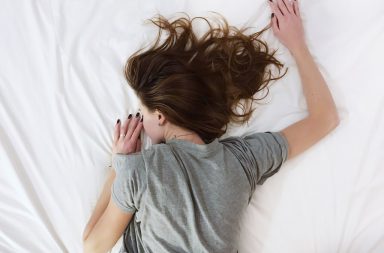If you suffer from sleep apnea, you’ll be no stranger to the struggle of finding a treatment to help relieve this tiring condition. But did you know there are essential oils for sleep apnea to help you get a good night’s sleep?
Sleep apnea is a common, yet frustrating sleep condition. Sufferers of sleep apnea can frequently stop breathing in their sleep, which makes it difficult to get a good night’s rest. Of course, you can try home remedies such as Horlicks or Ovaltine for sleep, but sometimes you need something a little more robust.
Horlicks or Ovaltine: Which Is Better for a Good Night Sleep?
Luckily, essential oils have become a popular home remedy for those with milder conditions. But with a whole range of essential oils out there, how do you know which will benefit you?
Well, we’re going to look at the 7 essential oils for sleep apnea, and how they could help you get some well-deserved rest!

Photo credit: mohamed Hassan via Pixabay
What Is Sleep Apnea?
Sleep apnea is a condition in which your breathing stops and starts whilst you are asleep. For some, it can be a serious condition, whereas other people may suffer from more mild symptoms.
Sleep apnea doesn’t only cause on and off breathing, however, it can also cause you to snore loudly and make choking and gasping noises during sleep. Not only that, but these symptoms also cause you to wake frequently during the night, leaving you feeling extremely tired during the day.
Obstructive Sleep Apnea (OSA) is the most common type of sleep apnea. This is when the throat muscles relax during sleep, causing the airways to narrow, when this happens, the blockage prevents your ability to breath.
Sleep apnea can cause those that suffer from it much stress and anxiety, particularly when it comes to finding a treatment.
But what are the causes of sleep apnea?
Well, there are many potential causes of this sleep disorder, some of which are preventable, others genetic.
Let’s take a look at common causes of sleep apnea:
- Having large tonsils
- Being overweight
- Drinking alcohol
- Smoking
- Sleeping on your back

Photo credit: Claudio_Scott via Unsplash
So, we know the causes of sleep apnea, and what the condition is, but how can you treat sleep apnea?
Well, those with serious sleep apnea may be prescribed the use of a CPAP machine. This helps pump air into your nose and mouth whilst you sleep.
For those with milder symptoms, there are home remedies you can try. This can be exercise, quitting smoking or even eating sleep-inducing foods, but the best one might be essential oils!
What Are the 5 Best Sleep-Inducing Foods?
So, what are essential oils and how can they help sleep apnea?
Let’s find out!
Essential Oils – What Are They?
What are essential oils? Well, it’s a good question.
You may have heard of essential oils being used for aromatherapy, or in oil burners. However, essential oils are actually used to treat a whole range of issues from colds and flu, to pimple and spot treatments. However, the most common use of essential oils as a home remedy, is to help sleep disorders.
How to Use Tea Tree Oil and Aloe Vera Gel For Pimples
Essential oils are concentrated essences that are extracted from plants. These extracts retain the scent and flavour of the plant they have been removed from. This extraction is usually done through distillation, so essential oils can be extremely potent when undiluted.
But how do essential oils benefit us?
Well, essential oils can trigger certain reactions from us depending on the scent we choose, for example, certain oils such as lavender can enhance feelings of relaxation and calmness. Whereas patchouli is a more stimulating scent prompting higher motivation levels and alertness.
Now we know what essential oils are, let’s look at which essential oils can be used for sleep apnea!
Essential Oils for Sleep Apnea: Which Ones Should You Try?
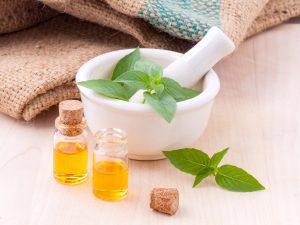
Photo credit: Seksak Kerdkanno via Pixabay
Essential oils are commonly used to help induce sleep and relaxation.
They are a popular choice for conditions surrounding sleep as they are 100% natural and can be used as often as necessary. Not only that, the use of essential oils can become a relaxing and meditative ritual and a personal experience for those using them.
So, which essential oils might assist with sleep apnea?
When applying any essential oil to the body remember to dilute it first. Please see below for instructions on how to safely apply essential oils.
Lavender
Lavender is commonly used for sleep conditions; this is due to the soothing and relaxing sensation it can induce. This essential oil can also reduce symptoms of stress and anxiety. These are commonly brought on by lack of sleep caused by sleep apnea.
Lavender is best applied to pillows, chest, neck, and feet before bed. You can also add this essential oil to a diffuser in the bedroom.
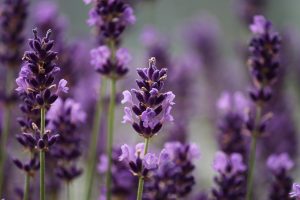
Photo credit: Manfred Richter via Pixabay
Thyme
This essential oil has many beneficial properties including microbial, antifungal, and even anti-aging. But how can it help sleep apnea?
Well, thyme oil is frequently used to aid respiratory conditions. The potent scent of this oil is excellent at clearing airways. Not only that, it may also cause relaxation of the brain’s cerebral cortex, making it perfect for the relief of sleep apnea.
Thyme can be applied topically to the feet and inner elbows – although must be diluted first. You can also add thyme oil to a diffuser to enhance the scent in the room.
Peppermint
Peppermint is an anti-inflammatory and is regularly used to clear the nasal passages of those with cold and flu. So, when it comes to snoring in sleep apnea, the use of peppermint oil can assist with reducing these symptoms by clearing congestion.
Peppermint oil is best applied topically to the chest or underneath the nostrils before bed.
Valerian
This essential oil comes from Valerian Root, a plant that has been used to treat sleep conditions for centuries. Valerian can promote feelings of calm and relaxation when used before bed.
This essential oil is best used in a diffuser in the bedroom through the night. This way, the scent fills the room and promotes a sense of calm during sleep.
Chamomile
Famous for its relaxation properties, chamomile is a perfect essential oil to reduce symptoms of sleep apnea. This essential oil promotes deep relaxation and can help prevent wakeful nights and aid with deep sleep. Chamomile is also linked to assisting with the nervous system in the body, which is connected to the causes of sleep apnea.
This relaxing essential oil can be used in a diffuser overnight to ensure the full effects of the oil are felt throughout.
Marjoram
Marjoram is well known for its ability to induce sleep and promote restfulness throughout the body. Its properties help to calm nerves, assist with respiratory issues and relax muscles – all key to reducing the effects of sleep apnea.
To use marjoram oil, you can apply topically to pulse points (wrists and inner elbows) or use through a diffuser. This is a strong oil so be sure to dilute before applying topically and to the diffuser!
Eucalyptus
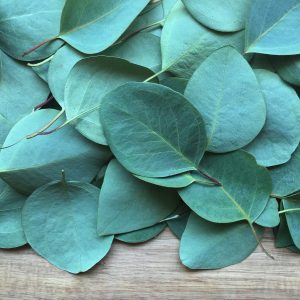
Photo credit: Laura Lisauskas via Pixabay
Eucalyptus is another essential oil that is frequently used to treat congestion in colds and flu. This is strong oil and can easily clear blocked sinuses – a common cause of snoring in sleep apnea.
Due to the strength of eucalyptus oil, it is best inhaled using a diffuser before bed. Another great way to use eucalyptus is to add a couple of drops to a hot bath. Not only will you be able to feel the full effects of the oil, it’s also a relaxing ritual before sleep.
So, now we know the 7 best essential oils for sleep apnea!
Now, let’s look at how you can use these essential oils safely to ensure you get the most out of their properties!
Essential Oils: How to Dilute Them Safely
As essential oils are concentrated extracts from plants, they can be extremely potent and strong. This means that when applied directly to the skin, they can cause irritation.
Even when adding essential oils to a diffuser, it is best to dilute them first. They will then release a more subtle but enjoyable scent.
So, how do you dilute essential oils properly?
To dilute essential oils for topical application you can:
- Add to a hot bath or shower
- Dilute two drops into a carrier oil such as coconut oil, then dab onto the skin
- Add two drops to a spray bottle of water and use as mist for your body or bed sheets
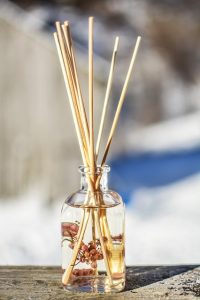
Photo credit: monicore via Pixabay
To dilute essential oils for a diffuser:
- Add two drops to water
- Fill the diffuser using the water and oil mix
Essential oils are extremely effective when it comes to assisting with sleep conditions. Not only that, but they can be used to calm our minds and bodies of feelings of anxiety, depression, and stress too.
Another common way to restore balance to our sleep patterns and energy balance is through Ayurveda. This holistic healing practice can offer many natural and home remedies to treat all kinds of conditions!
Ayurvedic Medicine: Advantages and Disadvantages to the Ancient Healing Practice


